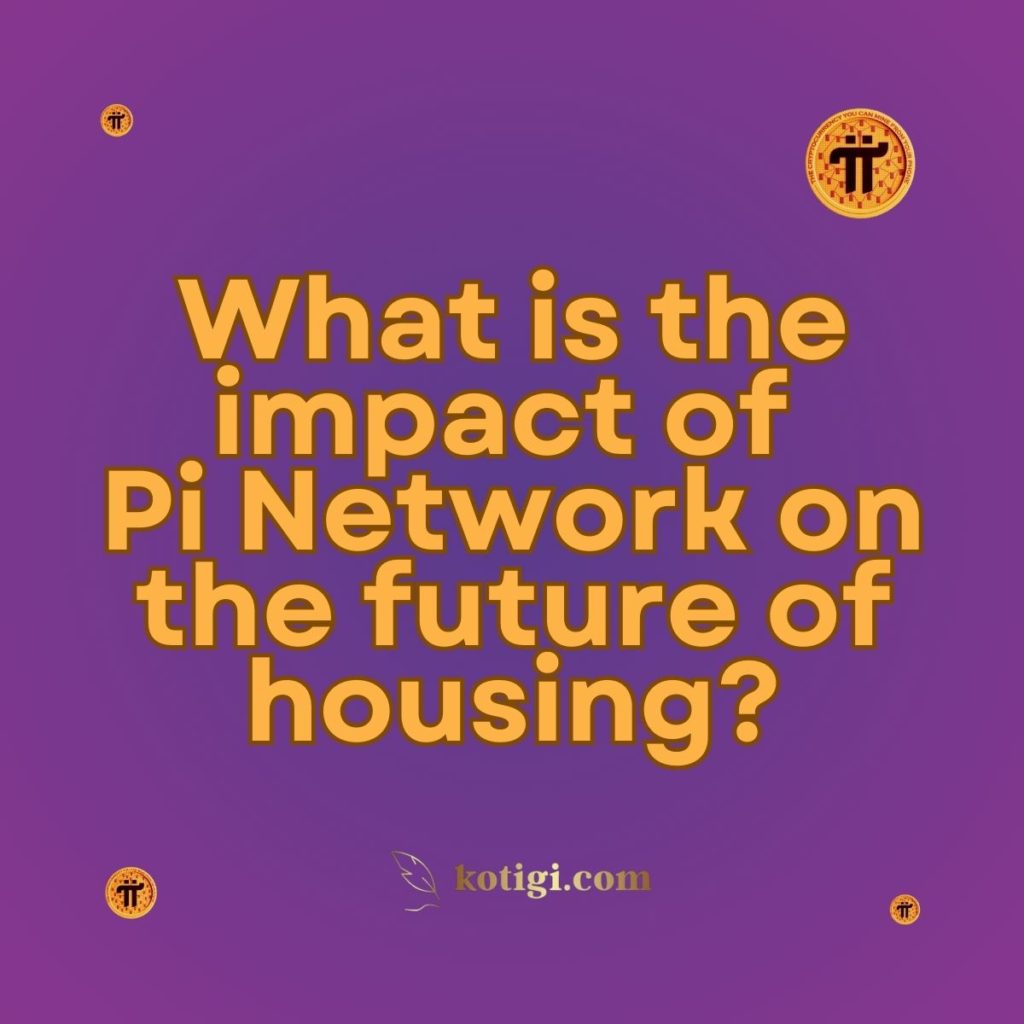
What is the impact of Pi Network on the future of housing?
Pi Network has the potential to revolutionize the housing industry through decentralized transactions, transparent ownership records, smart contracts, and peer-to-peer financing. This article explores how Pi Network could impact the future of housing, making home ownership more accessible, transparent, and efficient.
Introduction
The housing sector is one of the most critical aspects of any economy, but it also faces numerous challenges, such as affordability, transparency, and accessibility. Blockchain technology, particularly through decentralized systems like Pi Network, offers innovative solutions to these issues. By leveraging Pi Network’s blockchain, the future of housing could see major transformations in how properties are bought, sold, financed, and managed. The decentralized and transparent nature of blockchain can help reduce fraud, streamline property transactions, and empower individuals to engage in peer-to-peer real estate investments. In this article, we will examine the potential impact of Pi Network on the future of housing and how it can reshape the industry.
Decentralizing Property Transactions
Blockchain technology can decentralize and streamline the process of buying and selling homes, reducing transaction costs and increasing transparency.
Transparent Property Ownership Records
One of the main challenges in real estate is ensuring accurate and tamper-proof property records. Pi Network’s decentralized blockchain can store immutable property records, providing a transparent and reliable way to verify property ownership. This reduces the risk of fraud or disputes over property titles, ensuring that property ownership is clear and indisputable.
Eliminating Middlemen
Traditionally, real estate transactions involve intermediaries such as brokers, agents, and lawyers, which increase the overall cost of buying a home. Pi Network can eliminate the need for these intermediaries by enabling peer-to-peer transactions. Buyers and sellers can connect directly and use Pi coins for secure, cost-effective payments, speeding up the transaction process and reducing fees.
Reducing Transaction Costs
Real estate transactions typically involve a variety of fees, including commissions and closing costs. With Pi Network, smart contracts can automate these transactions, reducing the need for costly third parties and making the process more affordable. By using Pi coins for payments, homebuyers and sellers can bypass traditional financial institutions, further lowering transaction costs.
Enabling Smart Contracts in Real Estate
Smart contracts are self-executing contracts with the terms of the agreement directly written into code. They can transform the housing sector by making transactions more secure, transparent, and efficient.
Automating Property Transactions
With Pi Network’s smart contracts, property transactions can be automated without the need for manual intervention. The contract is executed automatically once the conditions—such as payment and transfer of ownership—are met. This automation reduces the risk of human error, ensures timely transactions, and builds trust between buyers and sellers.
Streamlining Rental Agreements
Pi Network can also revolutionize rental agreements. Smart contracts can automate rent payments and enforce lease terms without the need for a third party. Renters and landlords can use Pi coins for seamless transactions, with the terms of the lease automatically executed, such as deductions for repairs or rent adjustments.
Facilitating Fractional Ownership
Fractional ownership of real estate is an emerging trend, where multiple parties own a portion of a property. Pi Network can facilitate this by allowing individuals to invest in fractions of real estate through smart contracts. This opens up opportunities for more people to invest in the housing market, even if they cannot afford a full property, making real estate investment more accessible.
Promoting Peer-to-Peer Real Estate Financing
Pi Network’s decentralized model can enable new ways to finance homes, including peer-to-peer (P2P) lending and crowdfunding.
P2P Mortgage Financing
Traditionally, homebuyers rely on banks for mortgage financing, which often involves high interest rates and lengthy approval processes. Pi Network can disrupt this model by enabling P2P mortgage financing, where individuals can directly lend Pi coins to homebuyers. This decentralized system offers more flexible terms and faster approvals, providing an alternative to traditional financial institutions.
Crowdfunding Real Estate Projects
Pi Network’s blockchain can facilitate real estate crowdfunding, where multiple investors pool their resources to finance a property development project. Investors can contribute Pi coins, and the returns can be distributed proportionally. This model democratizes real estate investment, allowing smaller investors to participate in property development and housing projects.
Lowering Barriers to Home Ownership
For many people, the cost of buying a home is prohibitive. Pi Network’s decentralized financing options, including P2P loans and crowdfunding, can lower the barriers to home ownership. By providing more accessible and affordable financing options, Pi Network can help more individuals achieve the dream of owning a home.
Increasing Housing Market Transparency
Pi Network can help bring transparency to the housing market, making it easier for buyers, sellers, and investors to access accurate information about properties and transactions.
Transparent Valuation and Pricing
The current housing market can be opaque, with varying valuations and unclear pricing. Pi Network’s blockchain can provide a decentralized platform where property valuations are recorded and made available to all parties. This ensures that property prices are based on real, transparent data, reducing discrepancies in valuations and making the market fairer for all participants.
Reducing Fraud and Corruption
Fraud and corruption are common issues in real estate, particularly in developing markets. Pi Network’s immutable blockchain records ensure that all transactions and property titles are securely recorded, making it difficult for fraudulent activities to occur. Buyers can verify property ownership and transaction history with ease, ensuring they are making informed decisions.
Improving Real Estate Market Access
By creating a more transparent and accessible market, Pi Network can open up real estate opportunities to a broader audience. Individuals who previously lacked access to reliable information or financing options can now participate in the housing market, leading to more inclusive economic growth and development.
Supporting Sustainable Housing Solutions
Pi Network can promote sustainable housing by facilitating investment in eco-friendly homes and energy-efficient building projects.
Encouraging Green Building Projects
As sustainability becomes a priority in the housing sector, Pi Network can enable the financing of green building projects. Developers can use Pi coins to raise funds for eco-friendly housing initiatives, such as solar-powered homes or energy-efficient buildings. Investors can support these projects by purchasing fractional ownership through Pi Network’s decentralized platform, helping to promote sustainability in the housing industry.
Promoting Smart Homes and IoT Integration
Pi Network’s blockchain can also support the development of smart homes that integrate Internet of Things (IoT) devices. By using Pi coins, homeowners can purchase smart home systems that automate energy usage, improve security, and enhance convenience. Smart contracts can be used to manage these systems, ensuring seamless integration with the broader decentralized housing ecosystem.
Fostering Sustainable Communities
Decentralized housing platforms powered by Pi Network can foster sustainable communities where residents can trade services, share resources, and manage communal spaces through blockchain. These communities can use Pi coins to facilitate transactions within the community, such as paying for utilities or shared amenities, promoting a more sustainable way of living.
Conclusion
Pi Network’s decentralized blockchain technology has the potential to transform the housing industry, making property transactions more transparent, affordable, and accessible. By enabling peer-to-peer transactions, smart contracts, and decentralized financing options, Pi Network can democratize real estate investment and lower the barriers to home ownership. Furthermore, the transparency and security offered by blockchain can reduce fraud, increase trust, and encourage the development of sustainable housing solutions. As Pi Network continues to evolve, its impact on the future of housing could lead to a more inclusive, efficient, and eco-friendly housing ecosystem.
Key Takeaways
- Decentralized Property Transactions: Pi Network can enable peer-to-peer property transactions, eliminating intermediaries and reducing transaction costs.
- Smart Contracts for Real Estate: Smart contracts can automate property sales, rental agreements, and fractional ownership, streamlining the process and reducing human error.
- Peer-to-Peer Financing: Pi Network supports P2P mortgage financing and crowdfunding, making it easier for individuals to finance homes without traditional banks.
- Housing Market Transparency: Pi Network’s blockchain provides transparent property records and valuations, reducing fraud and making real estate more accessible to a broader audience.
- Sustainable Housing Solutions: Pi Network can promote green building projects and smart homes, encouraging sustainable living and eco-friendly housing developments.





